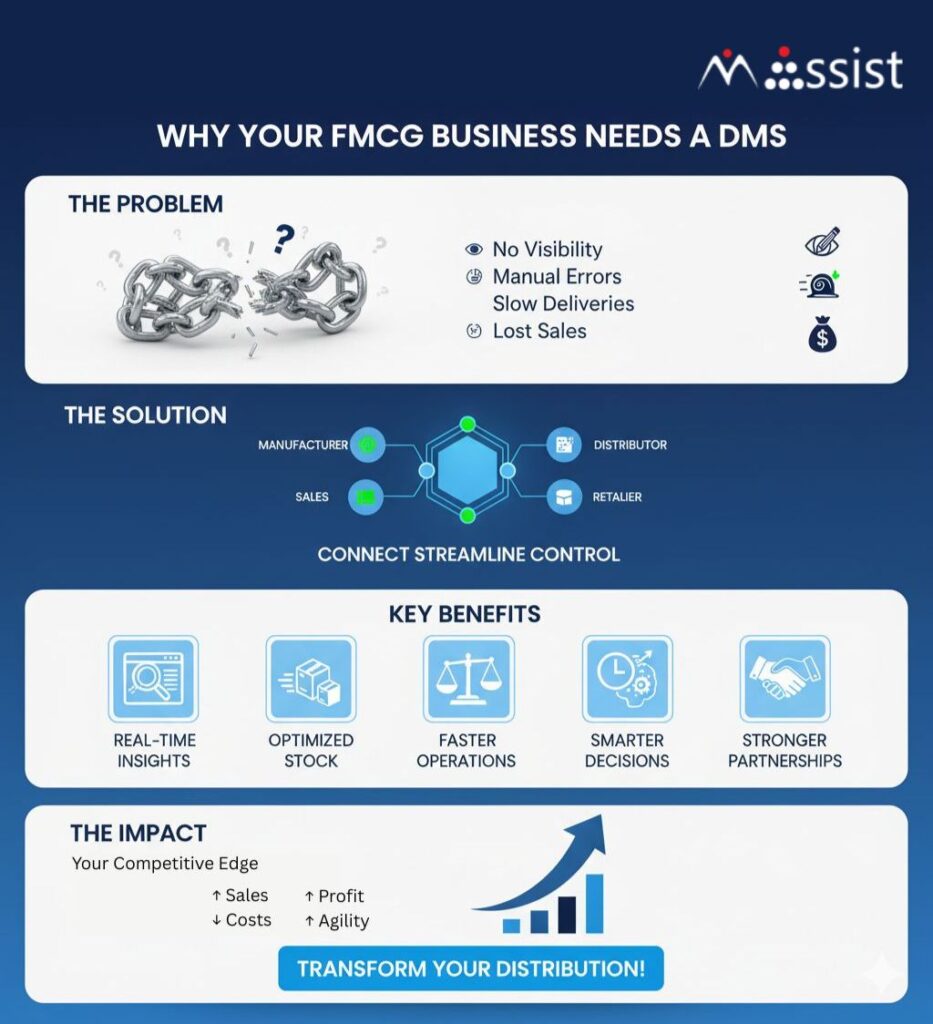India’s FMCG sector is experiencing a fundamental shift, driven by rising consumer demand, growing competition, and a rapid push toward digitization. In the middle of this change is one key transformation: the way distribution is managed.
While supply chains have traditionally been manual, fragmented, and prone to inefficiencies, forward-looking FMCG businesses are now adopting smarter tools to gain real-time visibility, reduce operational delays, and improve profitability. At the heart of this digital shift is the Distribution Management System (DMS), not as a buzzword, but as a practical enabler of modern supply chain success.
For businesses ready to scale, platforms like MAssist are making this transition not just possible, but seamless.
What Was Wrong with the Old Model?
FMCG distribution in India has historically been a multi-tiered, paper-heavy process. Manufacturers passed stock to super stockists, who managed distributors, who in turn supplied retailers, often tracking sales, schemes, and returns manually or on disconnected systems.
The result?
- Stockouts due to poor visibility
- Delays in order fulfilment and billing
- Inaccurate claim processing and promotion execution
- High operating costs due to inefficiencies
In short: great products often struggled to reach the right shelves at the right time.

Why Change Is Now Inevitable
Over the past few years, the landscape has shifted dramatically. These key trends are accelerating the need for digitization:
- Wider digital adoption across urban and rural India
- Regulatory requirements like GST compliance and e-invoicing
- Increased retail penetration across tier-2/3 cities and rural markets
- Heightened consumer expectations around availability and service levels
- Need for speed in responding to market shifts and competition
This has made it clear, traditional systems can no longer keep up with the scale, speed, and transparency that modern FMCG supply chains demand.
Enter the DMS: Smart, Centralized, Connected
A Distribution Management System offers a single source of truth for managing every aspect of secondary sales and distribution. Unlike legacy systems or basic ERPs, a DMS is purpose-built to handle complex FMCG operations across a fragmented distributor-retailer network.
Here’s what a modern DMS, like the one offered by MAssist enables:
- Real-time stock tracking at each distributor and warehouse
- Mobile-based ordering and billing for sales reps and distributors
- Automated scheme and promotion execution
- Returns, replacements, and claims management
- Performance dashboards to track channel productivity
- ERP and CRM integration for unified operations
And critically; it makes these features usable even in remote or low-connectivity areas, which is vital in the Indian market.
What’s Actually Changing on the Ground?
Let’s dig into the most impactful ways DMS is transforming India’s FMCG distribution:
1. Live Inventory Management
Manufacturers now have up-to-date insights into product availability at each distributor and can prevent stockouts or excess stock with proactive redistribution.
2. Digital Order Flow
Orders are no longer taken via WhatsApp or calls. Field reps and retailers can place and process orders via mobile apps, with immediate billing and invoicing.
3. Scheme Implementation & Monitoring
Trade schemes and discounts are applied digitally and verified at every transaction; ensuring transparency, better adoption, and fewer disputes.
4. Returns and Claims Automation
Distributors can log returns by reason codes (expired, damaged, etc.), and the system initiates automated claim workflows for quick resolution.
5. Insights & Reporting
With the MAssist reporting engine, brands can track sales by SKU, geography, distributor performance, and more, making data-driven decisions easier than ever.
6. Unified Ecosystem
All stakeholders – sales teams, distributors, logistics, and management; work off a single, integrated platform. No duplication. No disconnect.
Why MAssist?
Unlike generic DMS tools, MAssist is purpose-built for the complexities of Indian FMCG distribution. It combines powerful backend capabilities with a simple, intuitive interface that distributors and field users can adopt quickly.
Here’s what makes MAssist stand out:
- Designed for Indian field realities (low bandwidth, multilingual use, mobile-first)
- Deep integration with sales force automation, CRMs, and ERPs
- Custom workflows for schemes, claims, and secondary sales tracking
- Scalable architecture – from a single state to pan-India deployments
- Fast onboarding with dedicated support and training modules
This is not just a digital tool; it’s a practical partner in scaling your business operations.
Real Benefits for Real Stakeholders
Let’s look at how each part of the supply chain benefits from this DMS transformation:

Overcoming Challenges in Adoption
Yes, change takes effort. And yes, distributors and field teams may resist new systems; especially if they’re complex or poorly supported.
MAssist is built to address these concerns:
- Simple user interface for quick adoption
- Offline functionality for low-connectivity areas
- Multilingual support and regional onboarding
- Tiered pricing so even small distributors can benefit
- Continuous support from implementation to scale-up
Looking Forward: What’s Next in FMCG Distribution?
The future is already taking shape:
- AI and ML are improving demand forecasting.
- IoT devices are offering real-time warehouse data.
- Blockchain is enhancing transparency and trust in supply chains.
- Last-mile delivery innovations are reducing costs and carbon footprints.
As all this unfolds, a modern DMS will serve as the backbone – connecting data, people, and decisions.
Final Thoughts
India’s FMCG sector is at a tipping point. Brands that continue with legacy, manual systems will struggle to keep up. But those who embrace change – who digitize their distribution with the right tools – stand to win big in speed, reach, and growth.
The Distribution Management System isn’t a luxury anymore – it’s the foundation of a smarter, scalable, and sustainable FMCG business. With MAssist, this future isn’t just possible; it’s already happening.
Ready to transform your distribution network? MAssist is here to help you lead the change. Contact Us
Frequently Asked Questions –
Q1: What is a Distribution Management System (DMS) in FMCG?
A Distribution Management System (DMS) in FMCG is a software solution that helps manage secondary sales, distributor operations, order processing, inventory tracking, claims, and promotions. It provides real-time visibility and control across the entire distribution network.
Q2: Why is DMS important for FMCG companies in India?
DMS is crucial in India’s FMCG sector due to the complexity of multi-tier distribution networks. It helps reduce stockouts, ensures faster order fulfilment, improves promotion execution, and offers better data-driven decision-making.
Q3: How does MAssist support FMCG distribution?
MAssist provides a purpose-built DMS platform tailored for Indian FMCG operations. It offers real-time stock tracking, order automation, mobile billing, claims management, and seamless integration with ERP and CRM systems; all optimized for regional connectivity and scale.
Q4: What are the key benefits of using a DMS in FMCG supply chains?
Some key benefits include improved inventory accuracy, faster order processing, better scheme execution, reduced paperwork, real-time reporting, and enhanced coordination between manufacturers and distributors.
Q5: How does digital transformation affect FMCG distribution?
Digital transformation streamlines FMCG distribution by automating manual tasks, improving visibility, reducing costs, and enabling faster and more accurate service to retailers and consumers.
Q6: Can small and mid-sized FMCG businesses use a DMS?
Yes, modern DMS platforms like MAssist are scalable and affordable, making them suitable for businesses of all sizes; from large manufacturers to regional distributors and local FMCG brands.
Q7: What challenges do companies face when adopting a DMS?
Common challenges include resistance to change, lack of training, and low digital literacy among field users. However, platforms like MAssist address these with intuitive interfaces, regional language support, and dedicated onboarding assistance.
